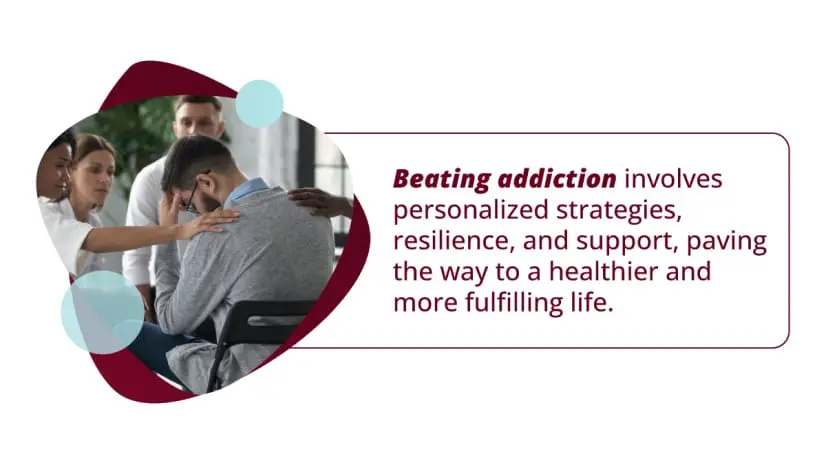
How To Beat Addiction
Clinically Reviewed by:
Addiction, whether to drugs or alcohol, is a challenging and often misunderstood condition. It’s more than just a habit; it’s a complex and compulsive need that affects the brain’s reward system, leading to cravings and loss of control.
Individuals in the throes of addiction find themselves caught in a cycle that disrupts daily life, relationships, and overall well-being. Luckily, there are numerous effective strategies to beat drug addiction.

Key Takeaways
Addiction is a complex struggle, but with commitment and tailored strategies, recovery is possible. Here is what you need to know:
- Addiction is a complex condition that develops gradually, impacting both mental and physical health.
- Recognizing and admitting that you have a drug or alcohol problem is the first step toward getting help.
- Various medical interventions and healthy lifestyle choices can help individuals beat drug use disorder.
Take the first step towards recovery with Indiana Center for Recovery’s comprehensive addiction treatment. Call (844) 650-0064 to reserve your spot.
Understanding Addiction
Addiction is a complex and chronic disease characterized by compulsive substance use, including drugs and alcohol, despite harmful consequences. It typically develops through a combination of genetic, environmental, and psychological factors.
Genetic predisposition plays a significant part, as individuals with a family history of addiction may be more susceptible. Environmental factors, such as exposure to substance abuse during childhood or stressful life events, can contribute to the development of addiction. In addition, chronic mental health conditions like depression or anxiety may increase vulnerability.
The initial use of drugs or alcohol is often voluntary, driven by curiosity, social pressure, or a desire for pleasure. However, repeated substance use can result in changes in the brain’s reward system, reinforcing the behavior and creating a powerful urge to continue use. Over time, tolerance develops, requiring larger amounts of the substance to achieve the same effects, further escalating use.
The transition from casual use to addiction involves the hijacking of the brain’s natural reward and pleasure mechanisms, leading to a loss of control over substance use. The individual may prioritize obtaining and using the substance above other responsibilities, jeopardizing personal relationships, work, school, and overall well-being.
However, addiction is not a moral failure. Addiction is a complex medical condition. Breaking free from drug and alcohol addiction demands a comprehensive approach, including medical intervention, therapy, and support systems.
Strategies for Getting Help for Addiction
Embarking on the journey to overcome addiction is a courageous step towards a healthier and more fulfilling life. Here are strategic steps to guide individuals in seeking help for addiction.
Acknowledge the Problem
Admitting that addiction is impacting your life is the initial and crucial step. Acceptance opens the door to seeking help and embarking on a transformative journey.
Reach Out to Loved Ones
Share your struggles with trusted friends or family members. Building a support system is essential. Loved ones can offer emotional support and encouragement throughout the recovery process.
Consult a Healthcare Professional
Seek guidance from a health professional who specializes in addiction. They can assess your situation, provide valuable insights, and recommend appropriate treatment options.
Research Treatment Options
Explore available treatment options. Researching and understanding different approaches will empower you to make sound decisions about your recovery journey.
Enroll in a Treatment Program
Taking concrete steps toward addiction recovery may involve enrolling in a treatment program. These programs offer structured support, counseling, and tools to overcome addiction.
Stay Committed
Recovery is a journey that requires commitment. Stay dedicated to the process, engage in therapy, and actively participate in support networks to strengthen your resolve.
By following these strategies, individuals can pave the way for a comprehensive and effective approach to overcoming addiction. Remember, seeking help is a sign of strength; with dedication, recovery is possible.
Types of Treatment Options for Addiction
Overcoming addiction is a challenging yet transformative journey, and understanding the available treatment options is crucial for success. Here are critical types of treatment for addiction, each playing a unique role in the comprehensive process of rehab.
Medical Detoxification
The first step in many substance addiction treatment plans is medical detoxification. Under medical supervision, this process involves safely removing substances from the body. Medical detox helps manage symptoms of withdrawal, ensuring a more comfortable and secure transition to the next phases of treatment.
Rehabilitation Programs
Rehab programs offer structured environments where individuals can focus on recovery. Inpatient programs provide immersive, 24/7 care in a rehab facility, ideal for those with severe addiction. Outpatient programs offer flexibility, allowing individuals to receive proper treatment while maintaining their daily lives. Both options emphasize counseling, support groups, and skill-building to promote lasting recovery.
Therapy and Counseling
Behavioral therapies and counseling are integral components of addiction treatment. These therapies help individuals identify and change unhealthy behaviors, develop coping mechanisms, and establish a support network. Cognitive-behavioral therapy (CBT), motivational enhancement therapy (MET), and dialectical behavior therapy (DBT) are among the widely used approaches.
Medication-Assisted Treatment (MAT)
Medication-assisted treatment (MAT) combines FDA-approved medications with counseling and behavioral therapies to address substance abuse disorders. This approach is particularly effective for opioid and alcohol use disorders. Prescription medications help manage powerful cravings and withdrawal symptoms, supporting individuals in maintaining abstinence while engaging in the therapeutic aspects of recovery.
Dual Diagnosis Support
Many individuals facing addiction also grapple with co-occurring mental health disorders. Dual diagnosis support acknowledges and addresses both addiction and mental health issues concurrently. Integrated treatment plans cater to the complex interplay between substance use and mental health, fostering a holistic approach to recovery.
A combination of these effective treatment options provides a well-rounded and individualized approach to overcoming drug addiction. Tailoring the treatment plan to specific needs under healthcare professionals’ guidance maximizes the chances of success.
Making Lifestyle Changes to Beat Addiction
Making lifestyle changes embraces a holistic approach to improving overall well-being. Here are some tips for each of the mentioned aspects:
Developing Healthy Habits
One key aspect of lasting recovery is the cultivation of healthy habits. This involves adopting a balanced and nourishing lifestyle that includes regular exercise, proper nutrition, and sufficient sleep. Establishing routines promotes stability and improves overall well-being, creating a foundation for sustained recovery.
Identifying and Managing Triggers
Recognizing and managing triggers is crucial in preventing relapse. Triggers are situations, emotions, or associations that may prompt a return to addictive behaviors. By identifying these triggers, individuals can develop coping mechanisms to navigate challenging situations successfully. This self-awareness is a powerful tool in maintaining a substance-free lifestyle.
Engagement in Holistic Therapies
Holistic therapies, such as yoga, meditation, and mindfulness practices, contribute to overall well-being. These approaches address the mind-body connection, providing individuals with tools to manage stress, feelings of anxiety, and drug cravings. Incorporating holistic therapies into the recovery journey fosters a balanced and centered lifestyle.
Building a Strong Support Network
A robust support network is instrumental in the recovery process. Surrounding oneself with understanding and encouraging individuals, whether friends, family, or support groups, provides a crucial safety net. Open communication and seeking help during challenging times strengthen the resolve to stay on the path of recovery.
Remember, making lifestyle changes is a gradual process, and being patient with yourself is essential. Small, sustainable changes over time can significantly improve your overall well-being.
Essential Support Resources for Beating Addiction
Beating substance use disorder is a challenging journey, and it’s crucial to have the right resources and support. Here are some general tools that may be useful:
Online Resources
The National Institute on Drug Abuse (NIDA) and the Substance Abuse and Mental Health Services Administration (SAMHSA) offer comprehensive online resources. These platforms provide evidence-based information, treatment locators, and valuable tools to assist individuals, families, and communities in understanding and addressing substance use disorders (SUDs).
Support Groups
Engaging with support groups creates a space for shared experiences and encouragement. Support groups offer a sense of community and understanding, whether in-person or virtual. Organizations like Alcoholics Anonymous (AA) and Narcotics Anonymous (NA) provide structured programs and meetings where individuals can connect with others facing similar challenges.
Books on Addiction and Recovery
Books can serve as powerful allies in the journey to addiction recovery. Notable reads include “In the Realm of Hungry Ghosts” by Gabor Maté, “The Power of Habit” by Charles Duhigg, and “Rewired: A Bold New Approach To Addiction and Recovery” by Erica Spiegelman. These books offer insights, motivation, and practical strategies to navigate the complexities of addiction and inspire positive change.
Frequently Asked Questions (FAQ)
Resilience is a crucial skill in avoiding substance abuse. Developing the ability to bounce back from stress, setbacks, and peer pressure enhances one’s capacity to make healthy choices and resist the temptation of substance use.
To overcome addiction, utilize online resources such as SAMHSA’s treatment locator. Indiana Center for Recovery offers treatment to Hoosiers all over Indiana. Learn more by calling an admissions counselor.
While it’s challenging, some individuals can overcome addiction independently. Success often depends on factors such as the type and severity of addiction, personal determination, and the availability of support. Seeking professional help significantly increases the likelihood of successful recovery.






 100% Confidential
100% Confidential